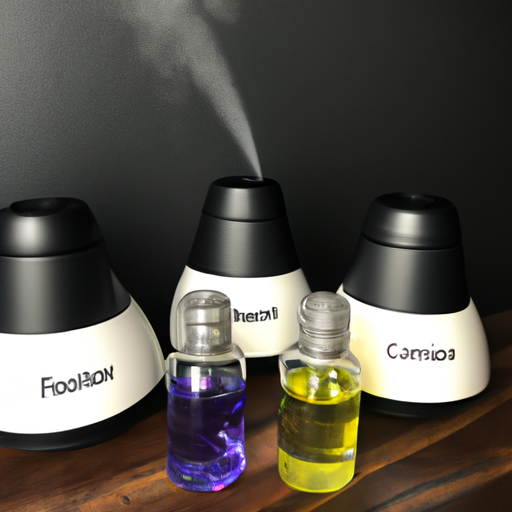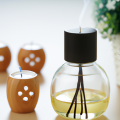-
Table of Contents
- Introduction
- A Comprehensive Guide to Essential Oils for Diffusing
- The Benefits of Diffusing Essential Oils
- How to Choose the Best Essential Oils for Diffusing
- The Different Types of Essential Oils for Diffusing
- The Pros and Cons of Diffusing Essential Oils
- How to Create the Perfect Aromatherapy Blend for Diffusing
- The Best Essential Oils for Diffusing in Different Rooms of Your Home
- Q&A
- Conclusion
Introduction
Essential oils are a great way to add a pleasant scent to your home, and diffusing them is a popular way to do so. Diffusing essential oils can also provide a variety of health benefits, depending on the type of oil used. With so many different types of essential oils available, it can be difficult to know which ones are best for diffusing. In this article, we will discuss the best essential oils for diffusing, as well as the benefits of diffusing essential oils.
A Comprehensive Guide to Essential Oils for Diffusing
Essential oils are a natural and effective way to improve your health and wellbeing. Diffusing essential oils is a great way to enjoy the benefits of these oils, as it allows you to inhale the therapeutic aroma of the oils. Diffusing essential oils can help to reduce stress, improve mood, and even boost your immune system.
When diffusing essential oils, it is important to choose the right oils for your needs. Different essential oils have different properties and can be used to treat different ailments. Here is a guide to some of the most popular essential oils for diffusing:
Lavender: Lavender is one of the most popular essential oils for diffusing. It has a calming and relaxing effect, and can help to reduce stress and anxiety. It can also help to improve sleep quality.
Peppermint: Peppermint is a stimulating oil that can help to improve focus and concentration. It can also help to reduce headaches and nausea.
Eucalyptus: Eucalyptus is a refreshing oil that can help to clear the airways and reduce congestion. It can also help to boost the immune system.
Lemon: Lemon is a refreshing oil that can help to improve mood and reduce fatigue. It can also help to purify the air and reduce odors.
Tea Tree: Tea tree is a powerful oil that can help to fight bacteria and viruses. It can also help to reduce inflammation and improve skin health.
Rosemary: Rosemary is a stimulating oil that can help to improve memory and concentration. It can also help to reduce stress and anxiety.
These are just a few of the many essential oils that can be used for diffusing. When diffusing essential oils, it is important to use a diffuser that is designed for essential oils. It is also important to follow the instructions on the diffuser and to use the recommended amount of essential oil.
By diffusing essential oils, you can enjoy the therapeutic benefits of these natural oils. With the right essential oils, you can improve your health and wellbeing in a natural and effective way.
The Benefits of Diffusing Essential Oils
Diffusing essential oils is a popular and effective way to enjoy the therapeutic benefits of aromatherapy. Essential oils are highly concentrated plant extracts that are known for their healing properties. When diffused, essential oils can help to reduce stress, improve mood, and promote relaxation.
One of the primary benefits of diffusing essential oils is that it can help to reduce stress and anxiety. The aroma of essential oils can help to create a calming atmosphere, which can help to reduce feelings of stress and anxiety. Diffusing essential oils can also help to improve mood and promote relaxation. The aroma of essential oils can help to create a sense of calm and relaxation, which can help to reduce feelings of depression and anxiety.
In addition to reducing stress and anxiety, diffusing essential oils can also help to improve sleep. The aroma of essential oils can help to create a calming atmosphere, which can help to promote restful sleep. Diffusing essential oils can also help to reduce symptoms of insomnia, such as difficulty falling asleep and waking up during the night.
Diffusing essential oils can also help to improve air quality. Essential oils can help to purify the air by removing airborne bacteria and other contaminants. This can help to reduce the risk of respiratory illnesses, such as colds and flu.
Finally, diffusing essential oils can help to improve mental clarity and focus. The aroma of essential oils can help to stimulate the brain, which can help to improve concentration and focus. This can be especially beneficial for those who are studying or working on complex tasks.
In conclusion, diffusing essential oils can provide a variety of therapeutic benefits. Diffusing essential oils can help to reduce stress and anxiety, improve mood, promote relaxation, improve sleep, purify the air, and improve mental clarity and focus. For these reasons, diffusing essential oils is an effective and popular way to enjoy the therapeutic benefits of aromatherapy.
How to Choose the Best Essential Oils for Diffusing
Essential oils are a popular way to add a pleasant scent to your home, and diffusing them is a great way to enjoy their benefits. When choosing essential oils for diffusing, there are several factors to consider.
First, consider the type of scent you want to create. Essential oils come in a variety of scents, from floral to citrus to woodsy. Think about the atmosphere you want to create and choose essential oils that will help you achieve that.
Second, consider the therapeutic benefits of the essential oils. Different essential oils have different therapeutic benefits, such as calming, energizing, or uplifting. Choose essential oils that will provide the benefits you are looking for.
Third, consider the safety of the essential oils. Some essential oils can be irritating to the skin or eyes, so it is important to read the labels and research the safety of the essential oils you are considering.
Finally, consider the quality of the essential oils. Look for essential oils that are 100% pure and free of any additives or fillers. High-quality essential oils will provide the best scent and therapeutic benefits.
By considering these factors, you can choose the best essential oils for diffusing and create a pleasant and therapeutic atmosphere in your home.
The Different Types of Essential Oils for Diffusing
Essential oils are a popular choice for diffusing, as they can provide a variety of benefits. Diffusing essential oils can help to improve air quality, reduce stress, and even boost energy levels. There are many different types of essential oils available, each with its own unique properties and benefits. Here is a look at some of the most popular essential oils for diffusing.
Lavender: Lavender is one of the most popular essential oils for diffusing. It has a calming and soothing effect, and can help to reduce stress and anxiety. It can also help to promote better sleep.
Peppermint: Peppermint essential oil has a refreshing and energizing scent. It can help to improve focus and concentration, and can also help to reduce headaches and nausea.
Eucalyptus: Eucalyptus essential oil has a strong, fresh scent. It can help to clear the airways and reduce congestion. It can also help to reduce stress and anxiety.
Lemon: Lemon essential oil has a refreshing and uplifting scent. It can help to boost energy levels and improve mood. It can also help to reduce stress and anxiety.
Tea Tree: Tea tree essential oil has a strong, earthy scent. It can help to purify the air and reduce bacteria and viruses. It can also help to reduce inflammation and improve skin health.
Rosemary: Rosemary essential oil has a woody, herbal scent. It can help to improve focus and concentration, and can also help to reduce stress and anxiety.
These are just a few of the many essential oils available for diffusing. Each essential oil has its own unique properties and benefits, so it is important to research each one before using it. Diffusing essential oils can be a great way to improve air quality, reduce stress, and boost energy levels.
The Pros and Cons of Diffusing Essential Oils
The use of essential oils has become increasingly popular in recent years, with many people turning to them for their therapeutic and medicinal benefits. Diffusing essential oils is one of the most common ways to enjoy their benefits, but it is important to understand the pros and cons of this method before deciding if it is right for you.
Pros
One of the main advantages of diffusing essential oils is that it is a safe and effective way to enjoy their therapeutic benefits. Diffusing essential oils can help to reduce stress and anxiety, improve sleep, and even boost your mood. It can also help to purify the air in your home, as many essential oils have antibacterial and antifungal properties.
Another benefit of diffusing essential oils is that it is a relatively inexpensive way to enjoy their benefits. All you need is an essential oil diffuser and a few drops of your favorite essential oil.
Cons
One of the main drawbacks of diffusing essential oils is that it can be difficult to control the amount of essential oil that is released into the air. If too much essential oil is released, it can be overwhelming and even cause headaches or nausea.
In addition, some essential oils can be irritating to the skin, eyes, and respiratory system. It is important to be aware of this and take the necessary precautions when diffusing essential oils.
Finally, it is important to note that diffusing essential oils is not a substitute for medical treatment. If you are experiencing any health issues, it is important to consult with your doctor before using essential oils.
In conclusion, diffusing essential oils can be a great way to enjoy their therapeutic benefits. However, it is important to be aware of the potential risks and take the necessary precautions. If you decide to use essential oils, make sure to do your research and use them safely.
How to Create the Perfect Aromatherapy Blend for Diffusing
Creating the perfect aromatherapy blend for diffusing can be a rewarding and therapeutic experience. Aromatherapy is the practice of using essential oils to promote physical and emotional wellbeing. Diffusing essential oils is a great way to enjoy the benefits of aromatherapy in your home or office. Here are some tips for creating the perfect aromatherapy blend for diffusing.
First, decide on the purpose of your blend. Are you looking to create a calming atmosphere, or do you want to energize the space? Knowing the purpose of your blend will help you choose the right essential oils.
Next, select the essential oils you want to use. Essential oils are highly concentrated, so it’s important to use them in moderation. Start with a base oil, such as lavender or chamomile, and then add a few drops of other oils to create a unique blend.
Once you’ve chosen your essential oils, it’s time to mix them together. Start by adding a few drops of each oil to a small glass bottle. Shake the bottle gently to mix the oils together.
Finally, add the blended oils to your diffuser. Depending on the size of your diffuser, you may need to adjust the amount of oil you use. Start with a few drops and adjust as needed.
Creating the perfect aromatherapy blend for diffusing can be a fun and rewarding experience. With a little practice, you’ll be able to create unique and therapeutic blends that will help you relax and enjoy the benefits of aromatherapy.
The Best Essential Oils for Diffusing in Different Rooms of Your Home
Essential oils are a great way to add a pleasant scent to your home. Diffusing essential oils can also provide a range of health benefits, such as reducing stress and improving sleep. Different essential oils are better suited for different rooms of your home, depending on the desired effect.
In the bedroom, lavender is a great choice for diffusing. Lavender is known for its calming and relaxing properties, making it ideal for promoting a good night’s sleep. Other good options for the bedroom include chamomile, ylang-ylang, and sandalwood.
In the living room, citrus essential oils are a great choice. Citrus oils are known for their uplifting and energizing properties, making them perfect for creating a cheerful atmosphere. Some good options for the living room include lemon, orange, and grapefruit.
In the bathroom, eucalyptus is a great choice for diffusing. Eucalyptus is known for its cleansing and purifying properties, making it ideal for creating a refreshing atmosphere. Other good options for the bathroom include peppermint, tea tree, and rosemary.
In the kitchen, rosemary is a great choice for diffusing. Rosemary is known for its stimulating and energizing properties, making it perfect for creating a lively atmosphere. Other good options for the kitchen include basil, lemon, and peppermint.
No matter which room you’re diffusing essential oils in, it’s important to remember to use them safely. Always follow the instructions on the product label and never diffuse essential oils around pets or small children.
Q&A
1. What are the best essential oils for diffusing?
The best essential oils for diffusing are lavender, eucalyptus, peppermint, lemon, tea tree, and rosemary.
2. What are the benefits of diffusing essential oils?
Diffusing essential oils can help reduce stress, improve mood, boost energy, and improve sleep. It can also help purify the air and reduce odors.
3. How long should I diffuse essential oils?
It is recommended to diffuse essential oils for 15-30 minutes at a time.
4. How often should I diffuse essential oils?
It is recommended to diffuse essential oils 2-3 times a day.
5. What type of diffuser should I use?
The type of diffuser you use will depend on the size of the room and the type of essential oil you are using. Generally, ultrasonic diffusers are the most popular and effective.
6. Are there any safety precautions I should take when diffusing essential oils?
Yes, it is important to keep essential oils away from children and pets, and to avoid contact with eyes and skin. It is also important to read the safety instructions on the label of the essential oil before diffusing.
7. Are there any essential oils that should not be diffused?
Yes, some essential oils should not be diffused, such as cinnamon, clove, oregano, and thyme. It is important to read the safety instructions on the label of the essential oil before diffusing.
Conclusion
In conclusion, the best oils for diffusing depend on the desired effect. For relaxation, lavender, chamomile, and ylang-ylang are great choices. For energy, citrus oils like lemon, orange, and grapefruit are great options. For a calming atmosphere, try sandalwood, cedarwood, and frankincense. Ultimately, the best oil for diffusing is the one that best suits your needs and preferences.




